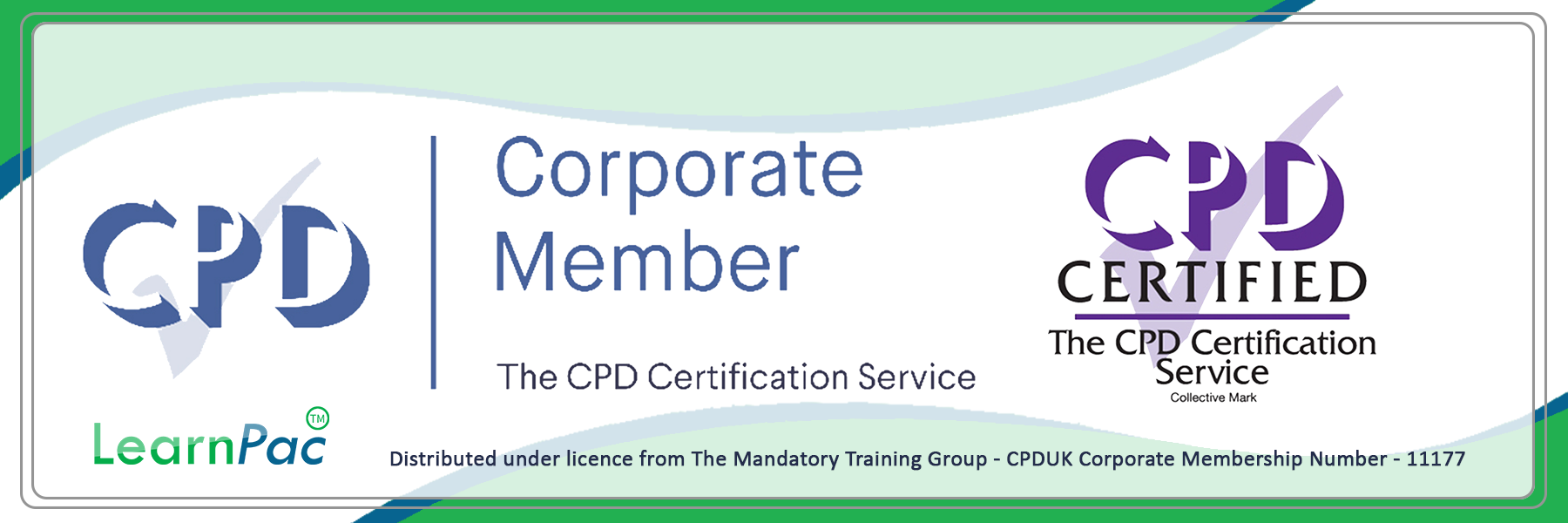Duty of Care - E-Learning Courses - CPDUK Accredited

Duty of Care – E-Learning Courses with Certificates – CPDUK Accredited.
LearnPac Systems is the leading UK provider of accredited statutory and mandatory training courses for all sectors, including health and social care, education, local government, private and charity sectors.
Duty of care e-Learning courses is designed to help you understand the legal obligations to protect your workplace and the people in it from harm and legal issues. During this course, employees will learn about: Work, health and safety (WHS) responsibilities, also known as the duty of care responsibilities.
Our duty of care e-Learning courses will equip learners with fundamental knowledge and skills in order to provide high-quality care and avoid preventable harm at all times.
Browse our Duty of Care - E-Learning Courses
Duty of Care: Frequently Asked Questions and Answers
Duty of Care – E-Learning Courses with Certificates – CPDUK Accredited – LearnPac Systems UK.
Here at LearnPac Systems, we receive many questions about duty of care. We have provided answers to the most frequently asked questions about duty of care.
Click on the text below to see the answers to the Frequently Ask Questions about Duty of Care.
Duty of care training is one of the 15 standards that are in the care certificate. The care certificate is an agreed set of rules that set out the expected job roles in the health and social care sector. It forms part of an induction programme that should be covered if you are ‘new to care’.
LearnPac Systems is the leading UK provider of accredited statutory and mandatory training courses for all sectors, including health and social care, education, local government, private and charity sectors.
Click here for Duty of Care – Online Training Course – CPDUK Accredited
- Duty of care is defined simply as a legal obligation to:
- Always act in the best interest of individuals and others
- Not act or fail to act in a way that results in harm
- Act within your competence and not take on anything you do not believe you can safely do.
LearnPac Systems is the leading UK provider of accredited statutory and mandatory training courses for all sectors, including health and social care, education, local government, private and charity sectors.
Click here for Care Certificate Training Courses – 15 Standards – CPDUK Accredited
The principle of duty of care is that you must avoid acts or omissions, which could be reasonably foreseen to injure of harm other people. This means that you must anticipate risks and provide high-quality care to avoid preventable harm.
LearnPac Systems is the leading UK provider of accredited statutory and mandatory training courses for all sectors, including health and social care, education, local government, private and charity sectors.
Click here for Care Certificate Standard 3 – Online Training Course – CPD Accredited
On the one hand, duty of care refers to the responsibility or legal obligation of a person or organisation to avoid acts or omissions that could likely cause harm to others. On the other hand, standard of care is only relevant when the duty of care has been established. The standard of care speaks to what is reasonable in certain circumstances.
When a duty of care is owed to a person, and it is breached resulting in injury or damage, the injured person can sue the person who breached the duty of care for damages, such as compensation for pain and suffering, and loss of enjoyment of life caused by physical injury, psychological injury or both.
Duty of care refers to the legal obligation to safeguard others from harm while they are in your care, using your services and exposed to your activities.
Safeguarding means protecting your right to live in safety, free from abuse and neglect. Local authorities have duties under the law towards people who are experiencing abuse or neglect, as well as those who are at risk of either.
A duty of care is breached on the following circumstances:
- A person is injured because of the action (or inaction) of another person
- It was reasonably foreseeable that such action (or inaction) would result in a risk of injury to the injured person
- The action (or inaction) causing the injury was unreasonable.
Duty of care contributes to the safeguarding or protection of individuals by keeping them safe, whether it is an illness, abuse, harm or injury. Duty of care is a legal requirement, and there are policies, procedures, code of conduct and legislation around safeguarding and protecting your service users.
Teachers must take reasonable care to ensure that their students are protected against foreseeable risks of personal injury or harm. The standard of care is that of a reasonably prudent parent.
Negligence is when someone owes you a duty of care but has failed to act according to a reasonable standard of care and caused your injury. You cannot take legal action against someone for being negligent unless you suffer some harm or loss as a result.
It is the responsibility of people who work in health and social care to work in a way that will help to prevent abuse. This means providing good quality care and support and putting the individual at the centre of everything, empowering them to have as much control over their lives as possible.
All players, coaches, referees and or organisers have to make all activities as safe as possible for themselves and other people in any sporting recreation environment. In the eyes of the law, this duty is referred to as the “duty of care”.
The duty of care in child care rests upon an individual or organisation. They must take all reasonable steps to ensure the safety of a child or young person involved in any activity or interaction.
A higher duty of care is a legal concept entailing the obligations of one party toward another. Some people, however, are regarded as having a higher duty, such as a professional code of conduct, that places them under heightened scrutiny if harm results from their actions.
All Department for Education staff owes a duty to take reasonable care and protect children and young people in their care from avoidable harm.
A local authority would have a duty of care if it “has created the source of danger or has assumed a responsibility to protect the claimant from harm”. Whether a council or social workers have “assumed responsibility” depends on the specific circumstances of individual cases.
A disability support worker has a duty of care to the person with a disability that they are supporting and others in the general community when working within a community environment. It can be a breach of the duty of care if a person behaves unreasonably or fails to act (which can also be unreasonable in a particular situation).
Duty of care benefits the organisation as a whole because it means that all employees work within the same guidelines and ensures that everyone has the best interests of the clients in mind. It also means that the environment is safe for all and that the organisation is working within legislative boundaries.
Duty of care is the responsibility of organisations and the people who work in them to protect the people they support. Still, it does not include protecting the person from themselves. Meanwhile, dignity of risk refers to the right of an individual to make choices and take risks to learn, grow and have a better quality of life.
The seven principles of care are as follows:
- Promoting effective communication and relationships.
- Promoting anti-discriminatory practise, including policies and codes of practice
- Maintaining confidentiality of information
- Promoting and supporting every individual’s rights to dignity, independence, empowerment, choice and safety
- Acknowledging individuals’ personal beliefs and identity and respecting diversity
- Protecting individuals from abuse
- Providing individualised care.
You have a duty of care to all patients or service users, even if you are not directly responsible for their care. The duty requires that all that is reasonable must be done to secure the best outcome possible.
LearnPac Systems is the leading UK provider of accredited statutory and mandatory training courses for all sectors, including health and social care, education, local government, private and charity sectors.
On successful completion of each of the duty of care courses modules, you will be able to download, save and/or print a quality assured continuing professional development (CPD) certificate. Our CPD certificates are recognised internationally and can be used to provide evidence for compliance and audit.
The CPD Certification Service (CPDUK) accredits all of our statutory and mandatory training courses as conforming to universally accepted Continuous Professional Development (CPD) guidelines.
LearnPac Systems is distributed under the licence from The Mandatory Training Group – CPDUK Corporate Memebrship Number – 1117.





